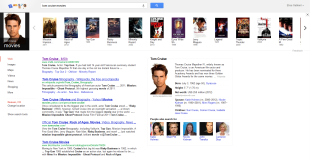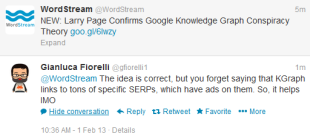About six months ago, I proposed a conspiracy theory that Google created the Knowledge Graph in order to “train” Google users to pay attention to the right-hand side of the SERP. Google can’t easliy monetize informational queries, but the Knowledge Graph could be a way to increase ad revenue across the board, by proactively changing the heat map so searchers start to view the whole page as useful, not just the organic results in the middle. Remember when Google said “Ads are just answers“? They are subtly reinforcing that viewpoint with Knowledge Graph, by providing rich “answers” right where the ads usually go!
And guess what? Larry Page kind of confirmed my theory on the Google Earnings Call last week (emphases mine):
Ben Schachter – Macquarie
Two questions for Larry around the notion of Answers not linked. First on Knowledge Graph, can you just give us a high level view on where we are in terms of its implementation and how widely it’s rolled out? And specifically, how if at all it impacts the economics of Google’s businesses? And then second Google Shopping, the PLAs and the interface changes, I think significantly improve the user experience, but the consumer still needs to leave the site to transact. Do you anticipate a mechanism whereas users can actually transact on Google Shopping without having to leave? You know, as you said sort of no extra work needed? Thanks.
Larry Page
Well, Ben, thank you for the questions. I think we rolled out Knowledge Graph very recently and I think we are still in the early stages of that. I think that, I mentioned some of the internationalization work that we did which is hard work and I think we’ll continue to do that. I mean it’s still 1% or something where we should be, so I am really excited about what we can do in the future. I think the economics points, I think that they way we look at it is we provide much better answers for people really grow the business. We increase the number times.
They might want information, because you know you are going to get correct answers or increasing it for modalities, you can get answers like Voice, or Mobile or so on, so I am somewhat excited about that and generally we monetize those things. So, generally we comment on specifics of that, but it think and we are quite excited about that.
The Knowledge Graph does run on the right hand side where the ads also run. Prospect there could be some short-term impacts on that, but I think the primary thing is getting people better answers is really good for our business. Shopping about product listing ads I think that for us in the early stages of that. We just rolled out Google Shopping. We are seeing tremendous uptake from merchants and from users and I expected those qualitative sight of data used, combined things will improve over time and I am really excited about that. I am not going to comment on details about that, but I’ll always focus on the getting user experience better. So, coming on to our next question please?
This has been crappily transcribed so it’s difficult to parse exactly what Larry Page actually said/meant, but it seems crystal clear that he just acknowledged the fact that Knowledge Graph goes where the ads go. They are very aware of the placement and implications. And notice how he talks about Knowledge Graph in the same breath as product listings? That’s because a lot of Knowledge Graph SERPs (like, say, for “Tom Cruise movies”) look similar to a SERP that’s heavy with product listing ads. Pretty pictures, very clickable:
 Larry Page Confirms Google Knowledge Graph Conspiracy Theory
Larry Page Confirms Google Knowledge Graph Conspiracy Theory
Here’s a more commercial SERP (“vaio laptops”) for comparison (click images to enlarge):
 Larry Page Confirms Google Knowledge Graph Conspiracy Theory
Larry Page Confirms Google Knowledge Graph Conspiracy Theory
I feel quite comfortable now saying my conspiracy theory isn’t so kooky.
What do y’all think?
UPDATE: Gianluca Fiorelli points out that the Knowledge Graph can increase ad revenue in a more direct way — by linking to SERPs that DO have ads on them:
 Larry Page Confirms Google Knowledge Graph Conspiracy Theory
Larry Page Confirms Google Knowledge Graph Conspiracy Theory
Very true.
More Business articles from Business 2 Community:
- Having An Internet Marketing Plan Is Like Having A Facsimile Machine 15 Years Ago
- 9 Reasons QR Codes are Bad for Your Brand
- A Quick Guide to Use Labels the Right Way for Your Business
- Does Buying Google Adwords Help Your Rankings?
- Human Resource Payroll—Tip-Top Managing for People Who Manage the Company




